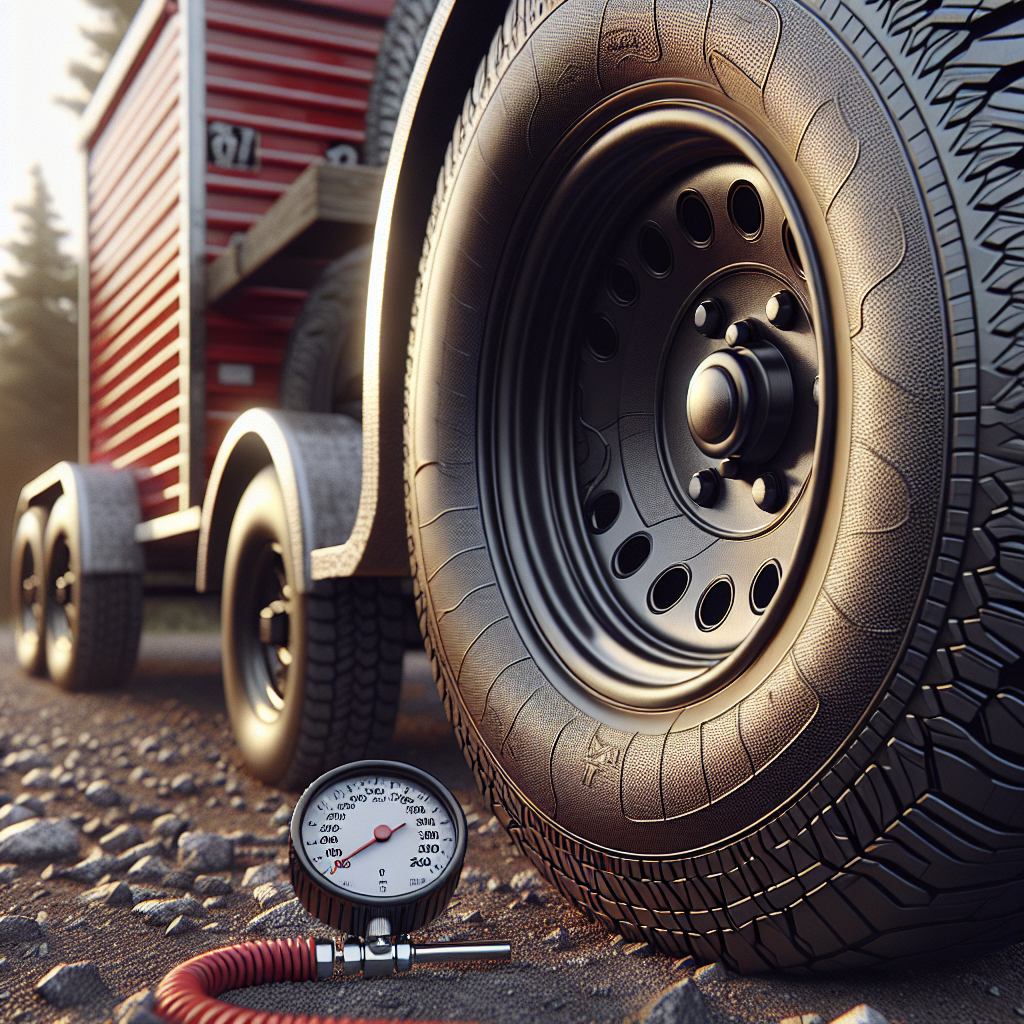Maintaining the correct tire pressure in your trailer is critical for several reasons. Properly inflated tires not only enhance the performance of your trailer but also ensure the safety of your load and the vehicle towing it. When tires are inflated to the recommended tire pressure, they provide optimal traction, which is vital for stable handling during turns and when braking.
Here are some key points to consider regarding trailer tire pressure:
- Load Capacity: Every trailer tire has a maximum load capacity that it can safely support. Under-inflated tires can cause excessive flexing, leading to overheating and potential blowouts.
- Fuel Efficiency: Proper tire pressure contributes to better fuel efficiency. Under-inflated tires increase rolling resistance, which can lead to higher fuel consumption.
- Tread Wear: Maintaining the correct pressure helps ensure even tire wear. Over-inflated or under-inflated tires can lead to uneven tread wear, shortening the lifespan of your tires.
Regularly checking the tire pressure before embarking on a journey is a good practice. This not only protects your investment but also enhances safety on the road. Make it a habit to consult your trailer’s owner’s manual for the specific pressure recommendations tailored to your model.
Tow with peace of mind, knowing that trailerwatchdog is standing guard.
What Is the Ideal Tire Pressure for Trailers

Determining the ideal tire pressure for your trailer is essential for ensuring both safety and performance. Generally, the recommended tire pressure can be found on a label located on the trailer’s tongue or in the owner’s manual. It is crucial to follow these guidelines to avoid potential issues.
The typical range for trailer tire pressure is between 50 to 80 PSI, but this can vary based on the type and model of the trailer. Factors to consider include:
- Trailer Type: Different types of trailers, such as utility, travel, or fifth-wheel trailers, may have varying pressure requirements.
- Tire Specifications: Always check the sidewall of the tire for the manufacturer’s recommended pressure. This information is critical, especially for specialized tires.
- Load Conditions: If you are carrying a heavier load, you may need to adjust the tire pressure accordingly. Overloading your trailer can lead to blowouts if the tires are not adequately inflated.
It’s important to note that tire pressure can fluctuate with temperature changes. A drop in temperature can reduce tire pressure, while warmer conditions might increase it. Therefore, always check tire pressure when the tires are cold for the most accurate readings.
How to Check Trailer Tire Pressure Effectively

Maintaining the correct tire pressure for your trailer is vital for safe towing and optimal performance. To ensure that your trailer tires are properly inflated, follow these steps for an effective tire pressure check:
- Gather the Right Tools: You'll need a reliable tire pressure gauge, which can be digital or manual. Make sure it is calibrated for accuracy.
- Check When Cold: Tire pressure should be checked when the tires are cold, ideally before you’ve driven more than a mile. This ensures that the heat generated from driving does not affect the pressure reading.
- Remove Valve Caps: Unscrew the valve caps from each tire and place them in a safe spot to avoid losing them.
- Insert Gauge: Firmly press the tire pressure gauge onto the valve stem and take the reading. Ensure you create a tight seal to avoid any air leakage that could result in an inaccurate measurement.
- Compare Readings: Compare the readings from your gauge to the recommended tire pressure listed on your trailer’s label or in your owner’s manual. If the pressure is too low or too high, adjustments are necessary.
- Inflate or Deflate: If the tire pressure is below the recommended level, use an air compressor to inflate the tire. Conversely, if the pressure is too high, release some air until it reaches the ideal level.
Regularly checking your trailer's tire pressure not only enhances safety but also improves fuel efficiency and extends tire life. Make it a habit to check your tire pressure before any long trips.
Impact of Incorrect Tire Pressure on Trailers

Maintaining the correct tire pressure for trailers is not just a matter of routine; it significantly impacts safety, performance, and longevity. Here’s how incorrect tire pressure can affect your trailer:
- Increased Risk of Blowouts: Under-inflated tires can lead to excessive heat buildup, which increases the risk of tire blowouts. This can be particularly dangerous while towing, possibly causing loss of control.
- Uneven Tire Wear: Incorrect tire pressure contributes to uneven tire wear. Over-inflated tires may wear out faster in the center, while under-inflated tires can wear on the edges, necessitating premature replacement.
- Reduced Traction: A tire’s ability to grip the road is compromised when it is not properly inflated. This can lead to decreased handling and stability, especially in adverse weather conditions.
- Poor Fuel Efficiency: Tires that are not inflated to the recommended pressure can lead to increased rolling resistance, which in turn causes your vehicle to consume more fuel. This can add unnecessary costs during long hauls.
- Negative Impact on Braking: Properly inflated tires are crucial for effective braking. Incorrect pressure can lead to longer stopping distances, reducing overall safety when towing.
- Compromised Load Capacity: Every tire has a specified load capacity that is contingent upon proper inflation. Incorrect tire pressure can exceed this capacity, leading to potential failure during transport.
In essence, maintaining the correct tire pressure is paramount for the safe operation of your trailer. Regular checks can help you avoid these potential issues and ensure a smoother journey.
Tips for Maintaining Trailer Tire Pressure
Keeping your trailer tires at the correct pressure is essential for safe towing and optimal performance. Here are some practical tips for maintaining trailer tire pressure:
- Check Tire Pressure Regularly: Make it a habit to check your tire pressure at least once a month and before long trips. Use a reliable tire pressure gauge for accurate measurements.
- Know the Recommended Pressure: Always refer to the trailer's owner manual or the sticker located on the trailer frame for the manufacturer’s recommended tire pressure. This ensures you are inflating them to the proper specifications.
- Inspect for Damage: Regularly inspect your tires for signs of damage, such as cracks, bulges, or foreign objects embedded in the tread. Address any issues immediately to prevent tire failure.
- Adjust for Load Variations: Consider the load you are carrying. Heavier loads may require a higher tire pressure to maintain optimal performance and safety. Always adjust your tire pressure according to the weight of the load being towed.
- Monitor Temperature Changes: Tire pressure can fluctuate with temperature changes. Check your tire pressure more frequently during extreme weather conditions, as both hot and cold temperatures can affect inflation levels.
- Utilize a Tire Monitoring System: Investing in a trailer tire monitoring system can provide real-time data on tire pressure and temperature, helping you maintain optimal conditions and prevent issues before they arise.
By following these tips, you can ensure that your trailer tires remain in optimal condition, enhancing safety and performance while on the road.
Benefits of Monitoring Trailer Tire Pressure Regularly

Regularly monitoring your trailer tire pressure offers numerous benefits that enhance safety and efficiency during towing. Here are some of the key advantages:
- Enhanced Safety: Proper tire pressure reduces the risk of blowouts, which can lead to dangerous accidents. By keeping an eye on tire pressure, you can ensure a safer towing experience.
- Improved Fuel Efficiency: Under-inflated tires can increase rolling resistance, leading to higher fuel consumption. Maintaining correct tire pressure can improve your fuel efficiency, saving you money on trips.
- Longer Tire Life: Tires that are consistently kept at their recommended pressure wear evenly, which extends their lifespan. This not only saves you money on tire replacements but also optimizes performance.
- Better Handling and Stability: Properly inflated tires enhance handling and stability, providing better control of your trailer while driving. This is especially crucial when navigating turns or driving on uneven surfaces.
- Real-time Alerts: Utilizing a tire monitoring system can provide real-time alerts on pressure fluctuations, allowing you to address issues before they become serious problems. This proactive approach ensures that you are always informed about your trailer’s condition.
Incorporating regular monitoring of your trailer tire pressure into your routine can greatly enhance your towing experience. Tow with peace of mind, knowing that trailerwatchdog is standing guard. Visit trailerwatchdog.com for more information on our advanced trailer monitoring systems.








